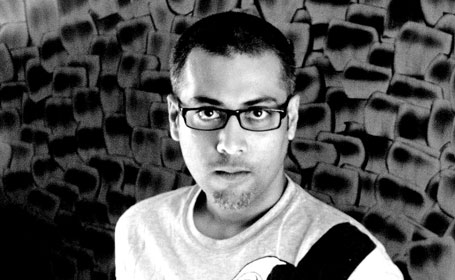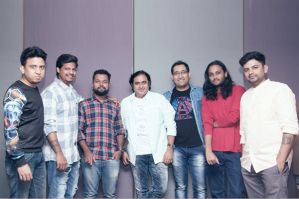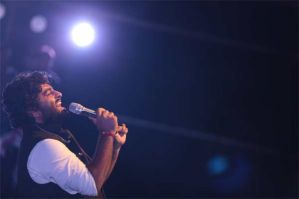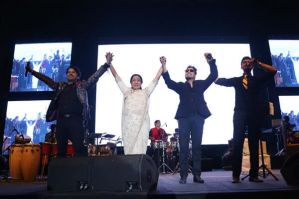Gaurav Shah: "Indian bands have the potential to make an impact globally"

With India slowly opening up to consume newer forms of music and acknowledge the independent music scene, emerging talents in the space are getting a chance to experiment with different styles. Fresh on the Indian music scene is an experiential band named 'Grasshopper' that was started by musicians sharing a strong vision to create music which strikes a chord with the listeners contemplative side.
Pushing the boundaries in the Indian market, the band is geared up to take the listeners on a musical journey with the launch of their new album ‘Mirrors of the Mind’.
In a casual chat with Radioandmusic.com’s Chandni Mathur, the band’s producer Gaurav Shah talks about Grasshopper’s style of music and the current space for independent musicians and bands in India today.
Excerpts:
Tell us about your style of music in the new album?
The album was conceived as a screenplay or a score to an imaginary film that unfolds in the listeners’ mind. It is the journey of going from a state of ‘Deadweight' where the protagonist feels something is weighing him down, and he articulates his emotions through the album until he reaches an emotional state, as evoked in track 10, ‘Weightless’.
The lyrics have been enveloped by long musical passages that gives space for the listeners to drift off and visualize what’s being said. Our compositional and melodic style is based on pure expression of the emotions that the songs warrant. For instance, ‘Deadweight’ has a strong uneasy undercurrent that puts you straight in the shoes of the protagonist. ‘Weightless’, a nine minute track with a four minute solo with atmosphere and space puts you in a situation where if you’re not feeling weightless by the end of it, something’s probably wrong with you.
What was the thought behind the quirky name of the band?
The entire point of symbolism is to see beyond what meets the eye. Some people just understand metaphors and symbolism whereas others need it to be spelt out. The name stems from the Grasshopper’s ability to only move forward that makes it symbolic of being a pioneer and one that moves into unchartered territories. These are the values that we as musicians live by which is to let our musical expression be a true reflection of our emotions and work with creative benchmarks that make our work unique and genre defining.
Being amongst the new musicians in the indie music scene, how do you see the space now for emerging bands like yours?
The Indian music scene is evolving at a pace that is unimaginable. There are new bands that are mushrooming every minute and each has their distinct flavour. This is exactly how the music scene should be vis-?-vis unlike the recent past where music in India was dominated by what is called as ‘Bollywood’ music.
Unfortunately, people have come to believe that music is what they hear in movies or on the television. People want to be spoon-fed whereas in the West, there’s a plethora of genres and sub genres that evolved decades ago. Art is only possible if there’s a culture of freedom of expression and individualism, and we’re unfortunately a collective society.
It is very difficult for independent bands and artistes to sustain themselves due to lack of publicity and more. How do you aim to work against it and create a mark for yourselves?
The starting point of this is to ask yourself why you’re in the music industry to begin with. If you’re in it for the money and popularity then it’s an uphill climb because that’s what most people are in it for. Then there’s a set of musicians who see themselves as artists who don’t necessarily do it for the money but more to push their own creative benchmarks. They do things because they are driven to push the envelope a notch further and they’re not competing with the industry.
If you just want to be a musician and entertain people, it’s going to be difficult to make a mark because there are many contenders. If you want to be an artist you need to send out a message to people, if people like your message they will listen to you. Else, you’re just singing because you can sing or perform and that makes you a part of the noise. Our endeavour is to be the signal that arrests your attention.
What went into conceptualizing Mirrors of the Mind?
We were clear at the outset that we wanted to put forth an experience for the listener. This is not a compilation of 10 songs where you pick a favourite and add it to your playlist. You listen to one song in isolation it’s like seeing one side of the Rubik’s cube and trying to solve the equation. The attempt was to step out of the ordinary and provide an experience with the album as one cohesive listening experience for people with imagination.
We’ve been working on this album since December 2011 and got into the studio in April 2012. We worked nearly 10-12 hours a day, each day for seven months till we got it just right. We even junked a finished song on the day of recording a particular track and said, this needs more work and can be done better. There were countless hours of conversation and debates on the logic of why a particular element should be retained or discarded. There was no ethos of ‘good take, let’s move on’. We were our own critiques and didn’t stop until the sponge was squeezed dry and it sounded just right to us in all aspects
.
Yours is stated to be a cinematic psychedelic based concept album. Elaborate a bit more on the concept and thought behind it?
The cinematic element comes from many facets – the album has a linear flow in script and musically, where one song seamlessly flows into the other rendering one continuous experience. The psycho-acoustics and metaphoric lyrics allow listener’s to visualize a moment or space that the protagonist is in. The psychedelia is an expression of giving listeners an experience of altered consciousness. We’ve infused atmosphere and space between notes, subtle effects and sonic treatments that give a true to life kind of experience.
How do you aim to release it?
The album is out on iTunes and OKListen. It is also available on digital platforms across the globe including Spotify, Nokia Ovi store, digital stores in Europe and US. Physical CDs are currently limited to sales only in India but we are working on the supply-demand and logistics in UK and Europe as we speak.
Which holds more importance for a band, physical sales or digital?
Generally speaking, sales are sales – physical or digital. The mindset to purchase physical CDs has deteriorated terribly. However, it brings me back to my point that if the artist or the music is fast food then it will be treated like an accessory but the minute you provide listeners with a fine dining, gourmet experience, they want to pay for your expertise. You’re more likely to cherish the experience for a longer time than a song that was the flavour of the season because you heard it on radio or television or YouTube.
It’s very difficult to penetrate the mindset that people have developed. You no longer find people that buy music or listen to albums from start to end or explore different genres of music or very few bands that believe in music as art and if you do, they are a minority.
What are the challenges you see for emerging bands?
The key challenge I see is having a clear belief system. They need to stand for something they believe in. It’s ironic because if you play a YouTube video that is absolutely dumb, people will gather around the screen to go watch it but the minute you play something remotely cerebral, you’ll find people switching off. The other challenge is marketing. Increasingly, bands and artists just go up on stage and perform. The importance of having a creative core where all art and expression stems from is grossly neglected.
Do you feel India is opening up to new forms of music?
Truly, it’s really a rich and fertile time for the music industry. There are so many bands and sub genres being created with unique flavors that are emerging in the music scene. The big gap is that it will take time for musicians and audience to be on the same platform. Musicians are creating music that is evolving faster than the sensibilities of the audience. The wider audience will take some time to accustom themselves to newer sounds and experiences but it won’t stop artists from putting it out.
AR Rahman is a classic example because what he did with Roja suddenly became the norm. People wanted his sound but now that people are used to it, it’s common now. The only way to evade that is that the artist should push his boundaries and up his own game to constantly create genre defining work that no one can emulate.
Where do you see the future of indie music scene?
The future is bright. The ecosystem is growing by leaps and bounds with companies like NH7, OKListen and newer record labels mushrooming and greater avenues for live concerts. There's a constant flow of bands in and out of the country and this in turn is shaping the audience sensibilities slowly but surely. The real measure of the indie scene growing is to see more people come out for concerts and support artists they love. We're reaching a stage where audiences take pride in local bands which is akin to what we keep hearing about bands that are big in Japan or Malaysia. We already have a host of bands that are popular in the country but the real future is Indian bands making an impact globally and there is immense potential for that to become a reality soon.

















